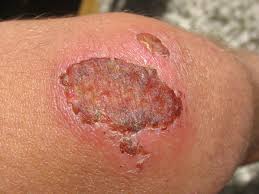记忆方法
1. 谐音“是痂吧?、是痂疤”。
2. 谐音“是块疤”。
2. 谐音“是块疤”。
中文词源
scab 痂,疥癣
来自古英语 sceabb,痒,疥癣,来自 Proto-Germanic*skab,抓,挠,刮,来自 PIE*skep,抓,挠, 刮,砍,词源同 ship,shave.后引申词义痂,疤痕。
英语词源
- scab
-
scab: [13] Old English had a word sceabb ‘scab’. This survived into modern English as shab, a dialectal synonym of scab, but it is only represented in the mainstream language by its derivative shabby. It is its Old Norse relative skabbr, borrowed in the 13th century as scab, which has become the general English term for a ‘crust over a wound’.
The derogatory sense ‘strike-breaker’ emerged in the 19th century from an earlier, 16th-century ‘despicable person’. The word comes ultimately from the Germanic base *skab- ‘scratch, shave’ (source also of English shave [OE]), which was descended from the same Indo-European base that produced Latin scabiēs ‘itch’ (source of English scabies [14], scabious [14] – a plant so called because it was supposed to cure skin diseases – and scabrous [17]).
=> scabies, shabby, shave - scab (n.)
- mid-13c., "skin disease," developed from Old English sceabb "scab, itch" (related to scafan "to shave, scrape, scratch") and from Old Norse skabb "scab, itch," both from Proto-Germanic *skab- "scratch, shave," from PIE *(s)kep- "to cut, scrape, hack" (see scabies). Sense reinforced by cognate Latin scabies "scab, itch, mange" (from scabere "to scratch").
Meaning "crust which forms over a wound or sore" is first attested c. 1400. Meaning "strikebreaker" first recorded 1806, from earlier sense of "person who refuses to join a trade union" (1777), probably from meaning "despicable person" (1580s), possibly borrowed in this sense from Middle Dutch.
权威例句
- 1. The mill was started up with scab labor.
- 罢工期间有人坚持上工,使得工厂重新开始运转。
- 2. When you cut yourself , blood clots and forms a scab.
- 你割破了, 血会凝固、结痂.
- 3. A scab formed on his leg.
- 他腿上结了个痂.
- 4. The scab has sloughed off.
- 痂脱落了.
- 5. In his heart of hearts, he sympathised with the strikers and hated this'scab. "
- 但在他的内心深处, 他是同情罢工并且憎恨这个 " 工贼 " 的.

